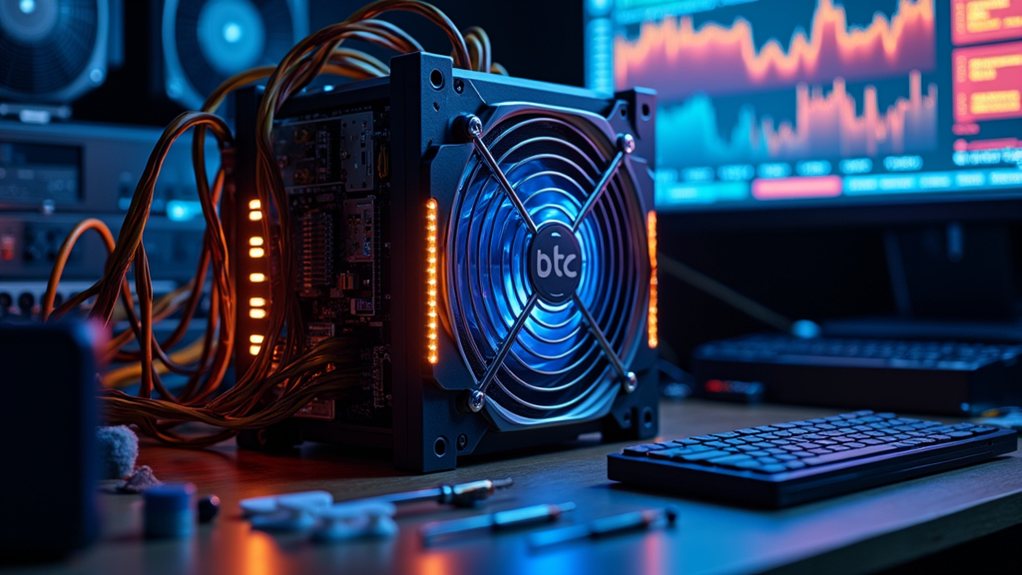Crypto forks happen when blockchains split, creating entirely new cryptocurrencies. They come in different flavors: hard forks (radical, not backward compatible), soft forks (conservative, compatible), and contentious forks (digital civil wars). Reasons range from adding features to fixing security issues. For holders, forks can mean free coins but also confusion. Technical challenges include replay protection and consensus mechanism changes. Tax implications exist too—the IRS wants its cut. The rabbit hole goes much deeper.

While investors scramble to keep up with volatile cryptocurrency prices, something far more fundamental occasionally rocks the digital currency world: the crypto fork. In simple terms, a fork is when a blockchain splits into two separate versions, creating a divergence that can lead to entirely new cryptocurrencies. It's like watching cellular division in real-time, except with billions of dollars at stake. These technological splits happen when developers modify the existing blockchain rules, either accidentally or on purpose.
Not all forks are created equal. Hard forks make radical changes that aren't backwards compatible—think Bitcoin Cash breaking away from Bitcoin in 2017 because some developers wanted bigger blocks. Period. Soft forks are more conservative, maintaining compatibility with the original chain. Then there are chain splits, source code forks, and those messy contentious forks where communities basically have a digital civil war. Drama sells, even in crypto.
A hard fork is blockchain's way of saying "irreconcilable differences" during a crypto divorce.
Why fork in the first place? Sometimes it's about adding cool new features. Other times, it's fixing security holes before hackers drain everyone's digital wallets. Occasionally, it's about undoing catastrophic events—Ethereum Classic exists because some people refused to reverse a $50 million hack. Philosophical differences drive forks too. Crypto is full of idealists with strong opinions on how things should work. When they can't agree, they split. These disagreements often reflect the community's vision for the cryptocurrency's future direction and development.
For regular crypto holders, forks can mean free money. If you owned Bitcoin before the Bitcoin Cash fork, congratulations! You suddenly had both. But it's not all rainbows and lambos. Forks create confusion. Which chain is the "real" one? Should you update your wallet? Will exchanges support both versions? The volatility around fork events makes regular crypto trading look stable by comparison. These events typically lead to significant market volatility as traders adjust their positions based on anticipated reactions from the broader community.
Behind the scenes, developers wrestle with technical challenges. They need replay protection to prevent transactions from being duplicated across chains. They might change block sizes, consensus mechanisms, or even completely revamp how mining works. Bitcoin Gold switched mining algorithms specifically to kick specialized ASIC miners to the curb. Some forks also involve shifting from energy-intensive Proof of Work to Proof of Stake systems that require validators to put up cryptocurrency as collateral instead of burning electricity.
When a fork looms on the horizon, savvy crypto users pay attention to official announcements. They secure their private keys, halt transactions during the critical period, and research community sentiment about the upcoming split. Tax implications? Yeah, those exist too. The IRS doesn't care about your blockchain drama—they just want their cut.
Love them or hate them, crypto forks are part of what makes this space dynamic. They're evolution in action, digital Darwinism playing out on public ledgers. Sometimes they fail spectacularly. Sometimes they change everything.
Frequently Asked Questions
How Do Crypto Forks Affect My Existing Coins?
Crypto forks don't touch existing coins. They're safe.
Hard forks create new coins—holders get an equal amount on the new chain.
Soft forks? Compatible with the original blockchain.
During forks, transactions might pause temporarily. Exchanges sometimes freeze withdrawals.
Smart move to control private keys when forks happen. Market values can go wild.
Replay attacks are a risk between chains. Not all wallets support forked coins.
Can Forks Lead to Security Vulnerabilities?
Forks definitely create security risks. Period.
When chains split, the attack surface expands dramatically. Rushed code? Security nightmares.
Replay attacks are particularly nasty—your transaction on one chain gets duplicated on the other. Oops, there go your funds!
Hash power divides, making both networks more vulnerable to 51% attacks.
And let's not forget the scammers. They love fork confusion—perfect time for phishing expeditions and fake wallet scams.
Are Forked Coins Automatically Added to My Wallet?
Forked coins aren't automatically added to wallets in most cases. It depends entirely on your setup.
Exchange-held coins? Usually credited automatically.
Self-custody wallets? Good luck—you'll need to claim them manually.
Wallet compatibility matters too. Your wallet needs to recognize that fork, and many don't bother updating right away.
Some wallets detect forks automatically, but don't count on it. The crypto world isn't exactly known for convenience.
How Are Fork Dates Determined and Announced?
Fork dates aren't random. Core developers assess technical readiness first, then gauge community consensus through forums.
They evaluate network requirements and check if exchanges are prepared. Once decided, it's announced everywhere—official websites, social media, developer lists, crypto news outlets.
Initial discussions start 3-6 months before target date. Formal announcement follows 1-3 months prior.
They'll specify exact block height, protocol changes, and required software versions. Pretty methodical process, actually.
What Tax Implications Do Crypto Forks Create?
Crypto forks create tax headaches globally.
Different countries have wildly different approaches.
US? Taxed as ordinary income when received.
UK? Only capital gains when sold.
Australia? No tax until you sell the new coins.
Japan gives forked coins zero tax basis.
Tracking these events is essential – mess up your reporting and tax authorities will come knocking.
Fork dates, values, access timing… it all matters.
Not fun.








